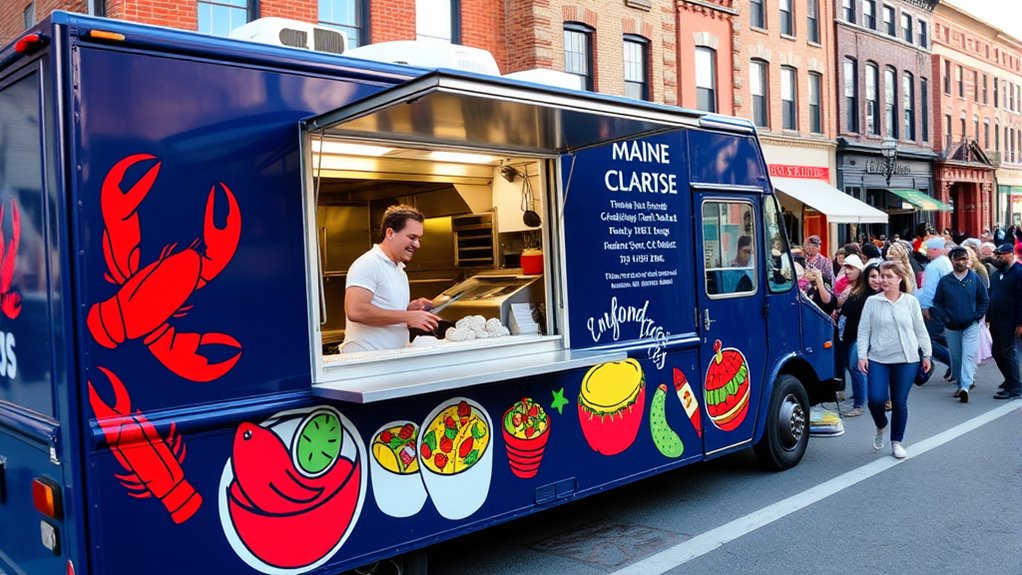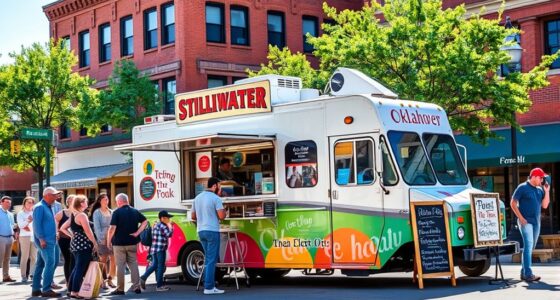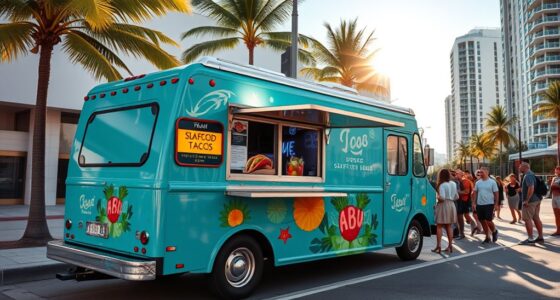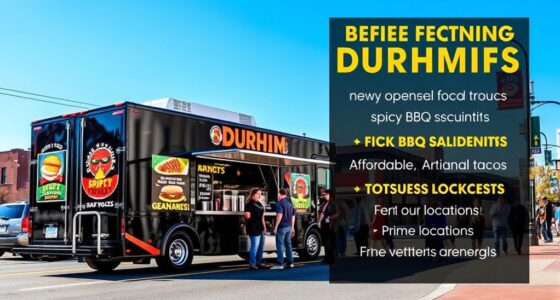To open a food truck in Bangor, Maine, you need several permits including a Mobile Eating Place license, Mobile Vendor License, and city-specific permits, with costs around $2,000 annually. Choose busy locations like downtown or waterfront, ensuring compliance with zoning laws. Develop a safe, appealing menu, and promote it through social media and community events. Managing ongoing licenses and safety standards is key—if you keep exploring, you’ll discover how to make your food truck a success.
Key Takeaways
- Obtain necessary permits including Mobile Eating Place, Vendor licenses, and city-specific approvals before launching.
- Budget approximately $2,000 annually for permits, vehicle costs, outfitting, insurance, and licensing renewal.
- Choose high-traffic, zoned areas like downtown or waterfront, and secure all zoning and parking permits.
- Develop a menu balancing safety, local flavors, and equipment limitations, and promote it through digital channels.
- Build a strong brand, engage with community events, and utilize social media to attract and retain customers.
Navigating the Permitting Process in Bangor
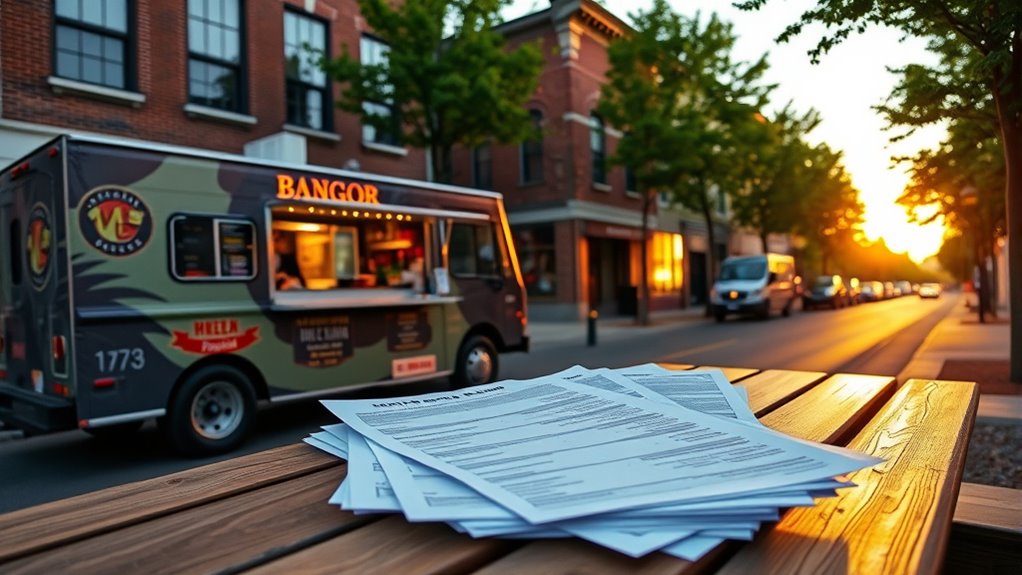
Understanding the permitting process in Bangor starts with understanding the specific licenses you need to operate legally. First, if you’re running a food truck, you’ll need a Mobile Eating Place license from Maine’s Department of Health and Human Services, which requires an application at least 30 days before opening. If you’re selling prepared, packaged foods offsite, you’ll need a Mobile Vendor License, costing $20 annually. You might also need additional licenses from the City of Bangor, reviewed by multiple departments, which are non-refundable. Inspections are scheduled in advance, not surprise visits, including health and fire marshal inspections for trucks with cooking equipment. You must also have a current vehicle registration with Maine BMV, and if applicable, a commercial vehicle inspection sticker. Proper licensing and inspections are essential to keep your food truck compliant and operational. Additionally,, obtaining the necessary permits ensures compliance with local zoning laws and helps prevent potential fines or shutdowns.
Understanding the Costs Involved in Starting Up
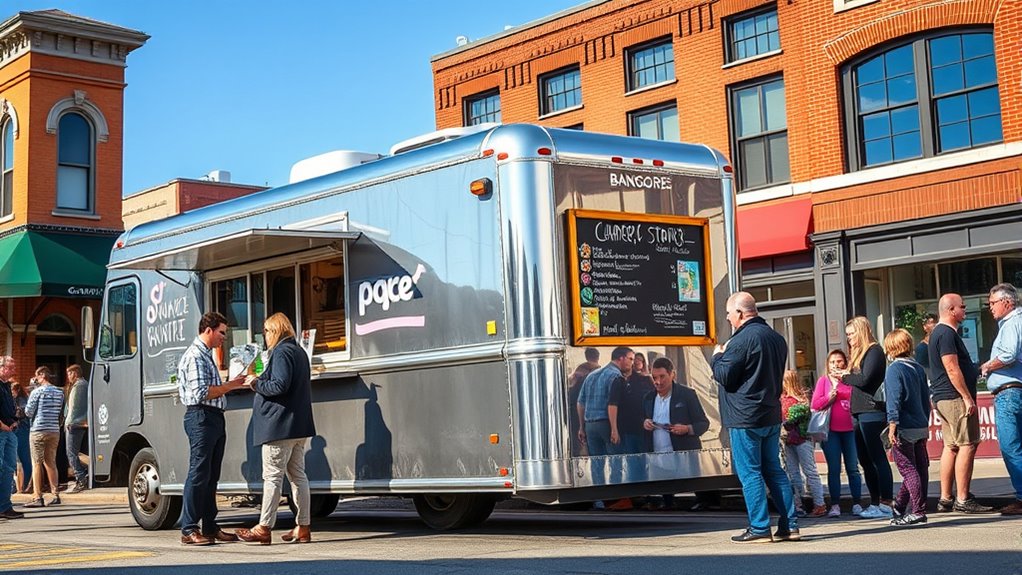
Starting a food truck in Bangor requires a clear grasp of the various costs involved, from initial vehicle investments to ongoing expenses. The biggest upfront investment is the truck itself, which can range from $20,000 for used models to $150,000 for customized new trucks. Then, outfitting it with kitchen equipment adds $10,000 to $50,000, depending on your menu. Additional costs include permits and licenses averaging around $2,000 annually, plus insurance to protect your business and vehicle. Startup costs for food trucks in Maine, such as commissary kitchen rentals and seasonal heating expenses, should also be factored into your planning. Consider these key expenses:
- Vehicle purchase or lease, which can be a significant initial outlay.
- Kitchen outfitting, essential for safe, efficient food prep.
- Permits and insurance, ongoing costs to keep your operation legal and protected.
Choosing Prime Locations and Complying With Zoning Rules
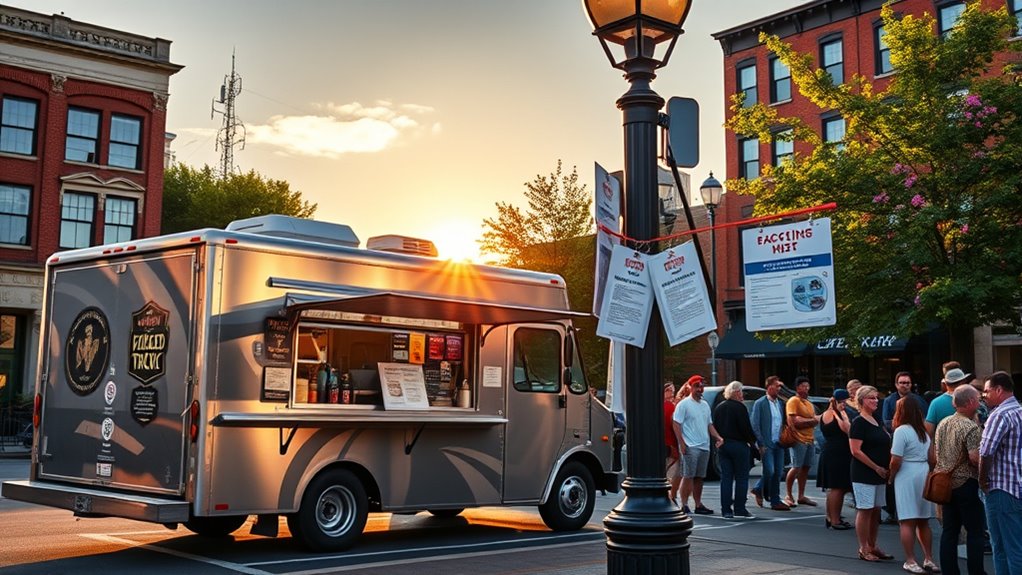
Choosing the right location is key to your food truck’s success, but you need to stay within Bangor’s zoning rules. High-traffic spots like downtown or waterfront can boost sales, yet they often come with permit requirements. Make sure you understand city regulations to select spots that maximize visibility without risking fines or shutdowns. Understanding local zoning laws and licensing requirements is essential to avoid legal issues and ensure smooth operations. Additionally, being aware of creative practice can help you adapt your marketing strategies and menu offerings to different locations, enhancing customer engagement.
Zoning Regulations Overview
Selecting the right location for your food truck in Bangor requires careful attention to the city’s zoning regulations. You must operate in zones designated for commercial or high-intensity use to stay compliant. To avoid issues, consider:
- Ensuring your chosen site aligns with Bangor’s zoning district map and land use plans.
- Securing all necessary permits, including zoning and parking licenses, before opening.
- Being aware that zone changes require applications, public hearings, and city council approval, which can delay your launch.
- Understanding local ordinances related to specific restrictions on food trucks in certain zoning districts to prevent potential violations. Additionally, familiarize yourself with zoning compliance requirements to ensure your business remains lawful and avoid penalties.
Failing to follow zoning laws risks fines or shutdowns. Also, remember health regulations and fire safety inspections are essential. Staying proactive and informed will help you navigate Bangor’s zoning landscape smoothly.
Strategic Location Selection
Identifying the right spot for your food truck involves more than just finding a busy area; it requires aligning your location with Bangor’s zoning rules and understanding customer flow. High foot traffic spots like Bangor Waterfront boost visibility and attract seasonal crowds. Proximity to events and concerts can drive spontaneous sales, while downtown locations with nearby parking support walk-in customers. Target areas with diverse groups—families, workers, tourists, students—to maximize appeal. Food truck parks and clusters, such as the Waterville Food Truck Park, offer operational benefits, shared amenities, and easier compliance. Consider seasonality—waterfronts peak in summer, but sheltered spots help maintain business year-round. Ensuring utility access, ample customer space, and avoiding oversaturated zones will optimize your strategic placement. Additionally, understanding local regulations and gold IRA investment principles can help you plan for long-term financial stability and growth.
Crafting a Safe and Appealing Menu for Your Food Truck
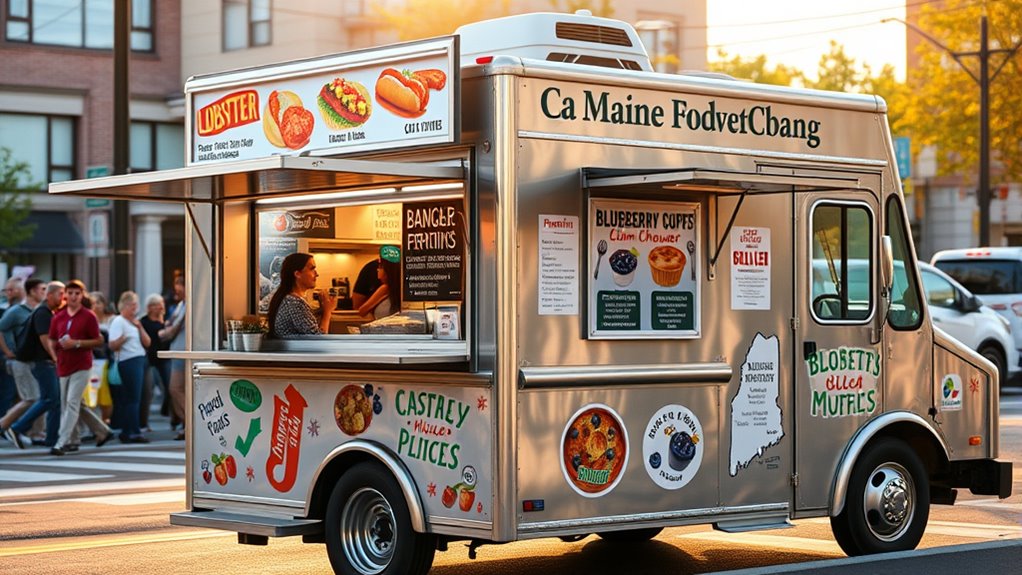
Creating a safe and appealing menu for your food truck requires careful planning to meet Maine’s food safety regulations while attracting customers. First, choose menu items that balance flavor and safety, considering equipment and space limitations. Second, verify your ingredients come from reputable suppliers and are stored at proper temperatures to prevent foodborne illnesses. Third, include consumer advisories for high-risk items, clearly displaying them on your menu to build trust. Focus on:
- Selecting dishes that are both popular and feasible within your truck’s setup.
- Using pre-packaged ingredients to reduce handling risks.
- Maintaining strict temperature controls and sanitation standards for all foods. Additionally, designing a layout that facilitates proper food storage and easy cleaning helps uphold safety standards and ensures a smooth operation.
Effective Strategies for Marketing and Customer Engagement
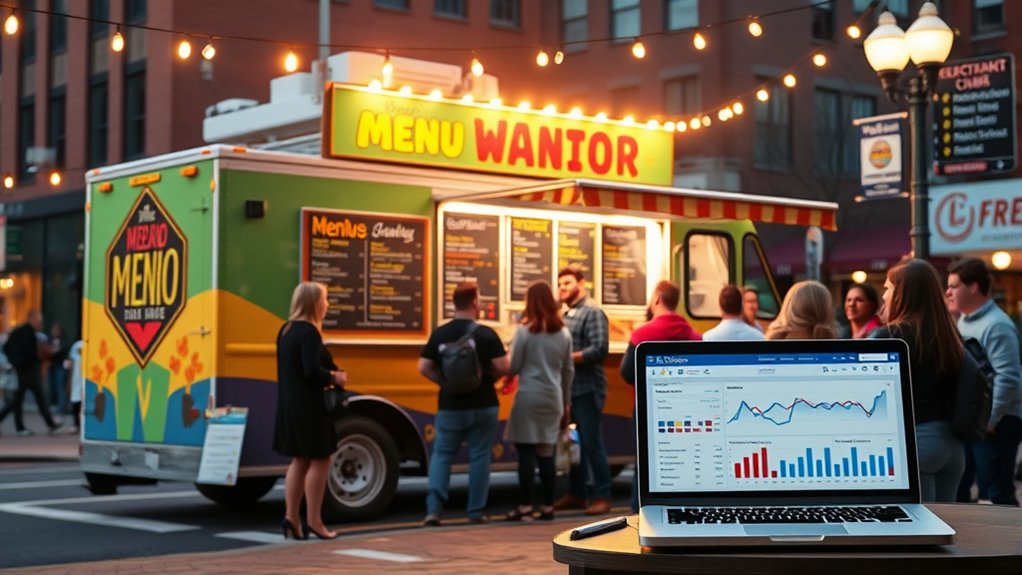
Once you’ve established a safe and appealing menu, the next step is to develop effective marketing and customer engagement strategies that build your food truck’s presence and foster loyalty. Start by creating a strong brand identity with consistent visuals like logos and colors that resonate with your target audience. Share your food truck’s origin story through menus, social media, and promos to build emotional connections. Partner with local businesses, participate in community events, and utilize cross-promotional materials to boost visibility. Maintain a professional, mobile-friendly website optimized for local SEO, and stay active on social media platforms like Instagram and Facebook by posting high-quality images, running contests, and sharing live updates. Implement loyalty programs via apps to encourage repeat business and gather customer insights for personalized marketing. Understanding Your Market can help you tailor your messaging and offers to appeal directly to the preferences of your core demographic. Additionally, leveraging Cultural Intelligence can enhance your ability to connect with diverse customer groups and adapt your marketing strategies accordingly.
Managing Operations and Ensuring Ongoing Compliance
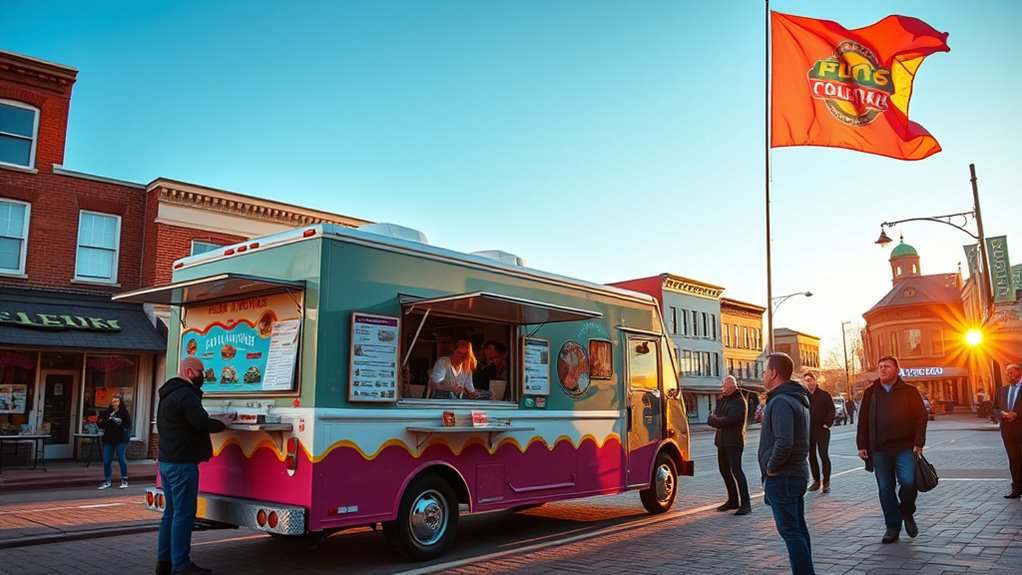
To keep your food truck compliant, you need to stay on top of regular safety inspections and guarantee your staff are trained according to Maine’s health standards. Renewing your licenses on time and managing any permit changes is essential for uninterrupted operations. By maintaining organized records and following proper procedures, you’ll keep your business running smoothly and within all regulations. Additionally, regularly reviewing Maine’s specific regulations can help you anticipate any new requirements and avoid inadvertent violations. Understanding essential oils for health can also be beneficial in creating a comfortable environment for your staff and customers, promoting overall wellness.
Regular Safety Inspections
Regular safety inspections are essential for keeping your food truck compliant and operating smoothly. These checks ensure you meet Maine’s health, vehicle, and safety standards. During inspections, officials verify:
- That your food preparation and dishwashing happen in licensed facilities, not in unlicensed kitchens.
- Your vehicle’s safety, including brakes, lights, and fire suppression systems, especially if your truck exceeds 10,000 pounds.
- Proper documentation of health policies, inspection reports, and licenses to avoid fines or shutdowns.
Failing to meet these requirements can lead to costly penalties or service interruptions, so stay proactive. Regular inspections aren’t just about compliance—they’re about protecting your business, your customers, and your peace of mind. Stay diligent, and your food truck will thrive.
Staff Training Requirements
Effective staff training is essential for maintaining compliance and ensuring smooth operations on your food truck. Maine requires all employees to complete food safety training, including Food Handlers and Certified Food Protection Managers (CFPM). Food Handlers need about two hours of training and must pass an exam on foodborne hazards and safety procedures. CFPMs must complete an accredited, 8-hour course covering FDA Food Code principles and pass a certification exam. Your food truck must have at least one CFPM and a trained Person in Charge (PIC) during operation. Training covers topics like pathogen control, cross-contamination, temperature management, hygiene, sanitation, pest control, and HACCP. Regular updates and refresher courses keep staff compliant and prepared for any health inspections. Additionally, understanding Floating on Water safety protocols can help prevent accidents and ensure a secure environment for both staff and customers.
License Renewal Procedures
Managing your food truck’s license renewal in Bangor requires staying attentive to deadlines and submitting applications on time to prevent operational disruptions. To keep your license active, guarantee you:
- Submit your renewal before the expiration date to avoid delays or fines.
- Pass required inspections—fire safety, health, and vehicle checks—to verify ongoing compliance.
- Maintain up-to-date records, including food safety logs, grease trap maintenance, and sales tax registration.
- Stay informed about any changes in licensing requirements or procedures by regularly checking with local authorities or official publications. Additionally, understanding regulatory compliance helps ensure that your operations remain smooth and within legal boundaries.
Late renewals can lead to license suspension, so keep track of renewal fees and documentation. Staying proactive helps you avoid unexpected closures and ensures your food truck continues serving customers without interruption.
Frequently Asked Questions
How Long Does the Entire Food Truck Permit Approval Process Typically Take in Bangor?
The entire food truck permit approval in Bangor usually takes several weeks to a few months. It depends on how complete your application is, how quickly departments review it, and when inspections are scheduled. Seasonal demand, like before summer, can slow things down. To accelerate the process, start early, stay in contact with licensing authorities, and make certain all your documentation meets requirements. Patience and preparation are key.
Are There Any Specific Health or Safety Training Requirements Beyond Certification for Staff?
You need to go beyond initial certification, as Maine requires staff to complete food handler training, including a 2-hour course and exam. You also need a Certified Food Protection Manager (CFPM) within 60 days of opening. Additionally, staff must learn fire safety, proper cleaning, pest control, and safety protocols for fuel and electrical systems. Ongoing compliance with Maine’s health standards and inspections is essential for safe, legal operation.
Can I Operate My Food Truck Year-Round in Bangor’S Climate?
Thinking about whether you can keep your food truck running year-round in Bangor is like steering a winter storm—challenging but possible. You’ll need specialized heating, insulation, and snow removal gear. Licensing and health regs remain in effect, so compliance is key. Expect reduced winter foot traffic, but with creative marketing and menu adjustments, you can turn the cold season into an opportunity rather than an obstacle.
What Are the Best Seasonal or Event-Based Locations for Food Trucks in Bangor?
You should focus on Bangor’s seasonal hotspots like the Bangor Waterfront during late spring to early fall, where foot traffic peaks during events and weekends. Bass Park After Dark and downtown Bangor near the Cross Insurance Center are also ideal for event-based vending. These locations attract crowds through festivals, concerts, and community gatherings, offering you prime opportunities to serve diverse customers and maximize your sales during peak seasons and special events.
Are There Any Grants or Financial Assistance Programs Available for New Food Truck Businesses in Bangor?
Are grants and financial help available for your new food truck in Bangor? You’ll find regional options like EMDC’s recovery grants and Maine SBDC’s business support, which can cover equipment and operational costs. While Bangor doesn’t offer direct food truck grants, these programs provide funding and technical assistance. Have you considered combining loans, crowdfunding, and local grants to finance your startup? These resources can make your food truck dream more achievable.
Conclusion
Starting a food truck in Bangor is a smart move, with the industry growing 7% annually nationwide. By understanding permits, costs, and locations, you set yourself up for success. Crafting a unique menu and engaging marketing will draw in crowds. Remember, staying compliant keeps your business running smoothly. With the right planning, you could be serving delicious food to hundreds of happy customers—so get started today and turn your food truck dream into reality!
